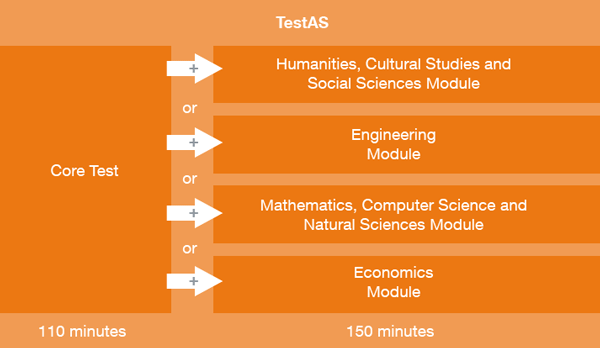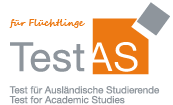How TestAS for refugees will help you
You can increase your eligibility for the subject, demonstrate your academic interests to universities and increase your chances of being admitted to university. If documentation regarding the courses attended at university or school certificates are missing (i.e. lost while fleeing), then the test may be used as a plausibility check. The test is also used for admission to preparatory programmes. The TestAS for refugees can be taken once only and is free of charge for the test takers (for details please see “Test dates”).
For universities using uni-assist’s documentation examination service for refugees, TestAS for refugees is the prerequisite to manifest the genuine desire to study as well as the suitability for the course (alternatively, universities may issue a so-called “counseling certificate”).
Apply to uni-assist using TestAS
The evaluation of application documents of international students and refugees for admission to university is handled by the Arbeits- und Servicestelle für Internationale Studienbewerbungen uni-assist e. V. in Berlin on behalf of many universities. These applications are free of charge for refugees.
Look for a suitable test date [link at the bottom].
Please consider the registration deadlines for TestAS
Find a test centre nearby
Use the information available on this website
Have a document ready for upload confirming your status as a registered refugee.2. You may then apply to uni-assist
Send your application [application form] for the free evaluation of your university admission credentials to uni-assist
attach a copy of the document ready for upload confirming your status as a registered refugee
attach a print-out of your TestAS certificate
All prerequisites for an application to uni-assist are available here or at the university of your choice.
Test structure
TestAS for refugees consists of a Core Test, which assesses the general ability to study and one out of four subject-specific modules. You can select a subject-specific module matching your planned course subject. The test may be sat in German, English and Arabic.

You can find further information for test takers here: Test-taker information English
TestAS is offered by the Society for Academic Study Preparation and Test Development (g.a.s.t.), a registered association. TestAS is developed by ITB Consulting GmbH. The worldwide organisation of TestAS is conducted by the TestDaF Institute, Bochum. TestAS is sponsored by the German Academic Exchange Service (DAAD) with funds from the German Federal Ministry of Education and Research (BMBF).
Preparation for the test
TestAS for refugees is not a knowledge based test, you cannot “learn by heart” to prepare for it. The test assesses your cognitive skills. It is therefore important that you familiarize yourself with the format of the tasks asked in the test. A comprehensive booklet with Sample Questions, explanations and solutions is available free of charge.
The English version can be found here.The Arabic version can be downloaded here: Sample_Questions_Arabic
Universities, testing centres and institutions may also order the Sample Questions from the TestDaF-Institute.
The Sample Questions describe all subtests in detail.
Test dates
Here you can find the dates for the TestAS for refugees. For registration, please visit the test-taker portal for the TestAS for refugees: Registration TestAS for refugees
on 19 January 2019
Registration from 03 December until 01 January
on 28 Februar 2019
Registration from 03 Januar until 11 February
on 06 April 2019
Registration from 13 February until 20 March
on 16 May 2019
Registration from 22 March until 26 April
on 29 June 2019
Registration from 29 April until 07 June
on 03 August 2019
Registration from 12 June until 14 July
on 10 September 2019
Registration from 16 July until 20 August
on 12 October 2019
Registration from 21 August until 22 September
on 14 November 2019
Registration from 24 September until 24 October
on 14 December 2019
Registration from 25 October until 25 November
Please note that the participating centres can vary between the test dates.
Important notes:
– The TestAS for refugees is free of charge and each participant can take the test only once. You cannot pay to participate in the TestAS for refugees. If you wish to repeat the exam you may register for the regular TestAS (test languages German or English): Test dates regular TestAS
– If you have registered for the test but do not show up your participation still counts. That is because a large part of the costs have already incurred.
– You can cancel your registration for the TestAS until the end of the registration period (send an email with your participant number to kontakt@testdaf.de). After that period we cannot guarantee your cancellation.
– The login data that you choose during registration only work for the test-taker portal for the TestAS for refugees (Test-taker portal TestAS for refugees). They cannot be used to log into the regular TestAS portal.
The following exceptions regarding the participation are valid
– In case you have taken the TestAS for refugees on May 19 2016, you are permitted to take the test a second (but no further) time in the test language Arabic (but not in German or English).
– In case you were registered for the TestAS for refugees on May 19 2016, June 25 2016 or July 28 2016 but you did not show up, you are permitted to register a second (but no further) time.
– In case you have taken the TestAS for refugees once already but you would like to take the test a second time with another subject-specific module, you are temporarily permitted to do so in the following case: In the first TestAS for refugees, you have reached a standard value of at least 100 (100 or higher) in the core test and a standard value of under 90 (89 or lower) in the subject-specific module.
TestAS examinations for universities and institutions
Please keep in mind that for a test session at your location we need a lead time of at least four weeks in order to allow the testing session to go smoothly.
Results will be released after seven working days.
Who may sit TestAS for refugees
The TestAS for refugees is free of charge and can be taken only once per person. A no-show also counts as a participation (please see explanations under “Test dates”). The following persons are entitled to participate once:
– Asylum seekers (ongoing proceedings – residency permit pursuant to § 55 AslyVfG)
– Tolerated foreign nationals (temporary suspension of removal – tolerated pursuant to § 60a AufenthG)
– Individuals granted asylum pursuant to Art. 16A GG/GFK (residency permit pursuant to § 25 para. 1 AufenthG)
– Recognized refugees pursuant to § 3 AsylVfG (residency permit pursuant to §25 para. 2 p.1/1 AufenthG)
– Individuals granted subsidiary protection pursuant to §4 AsylVfG (residency permit pursuant to §25 para. 2 S.1/2. AufenthG)
– Persons protected from removal pursuant to §60 para. 5 and 7 AufenthG (residency permit pursuant to §25 para. 3 AufenthG)
– Persons with a residence permit in accordance with § 22 par. 1 and 2, §23 par. 1, 2 and 4, as well as § 24 and § 25 par. 5 AufenthG
– Family members (parents, children, spouses), who have joined recognised refugees or asylum seekers as defined under the Geneva Convention or those granted subsidiary protection, may also participate in the free review process if they can provide proof that the “principal” person (the first to be granted refugee status) has a residence permit.You will be asked for your status when registering for the test. You will then be able to sit the test free of charge. Please have photos or scanned residency documents ready; you will be asked to upload documents when registering.
The TestAS certificate
Your TestAS certificate will be available for download from your candidate portal approx. 2-4 weeks after the test.
– the percentile rank
– and the default value
The Standard Score is a transformation of the test score to a value between 70 and 130. The mean (average) is 100. The area between 90 and 110 describes the average performance. The standard score allows a direct comparison between all test modules and subtests.
The Percentile Rank describes the percentage of other test takers who have a test score that is lower or as good as a candidate’s score. A percentile rank of 60 means for instance: 60% of all test takers have a lower score or a score that is as good as the candidate. That means that 40% have reached a higher score. Universities can create a rank order with the percentile ranks of the current applications (to, for example, select the applicants with the 10 best percentile ranks).
Both scores always refer to the entire test-taker group (in all test centers and from all test dates).
Standard scores and percentile ranks are calculated for both the modules (e.g., the Core Test) and for the subtests. The standard score/percentile rank of a module does not always correspond to the average of the standard scores/percentile ranks of the single subtests.
Universities decide individually how they use the TestAS results. They can, for instance, define a minimum for the required standard score (e.g., 100) or give applicants with high scores a bonus. Please visit the universities’ webpages for further information.
